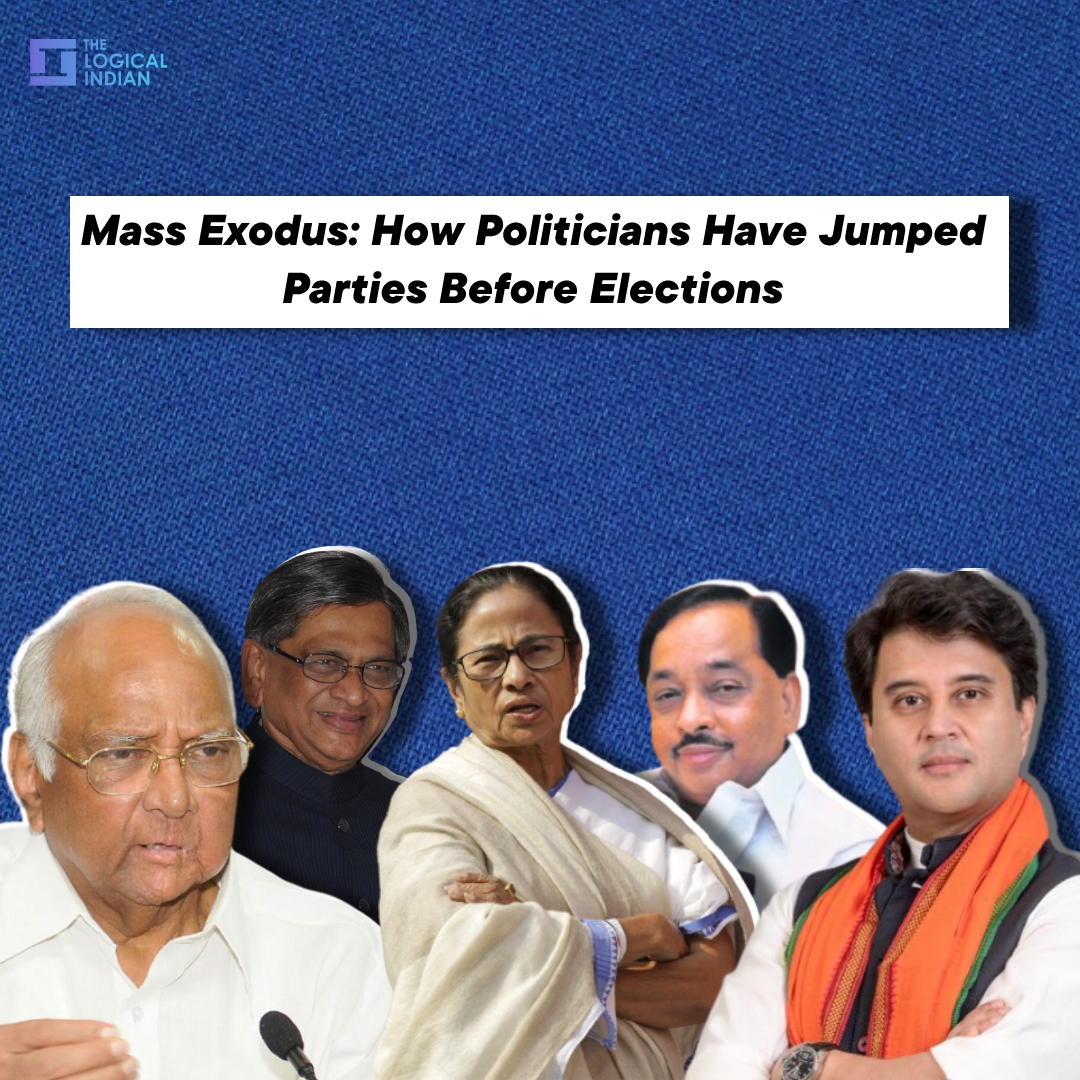
Credits- Wikipedia, Wikipedia, Wikipedia, India Times, Twitter
Mass Exodus: How Politicians Have Jumped Parties Before Elections
India, 13 Jan 2022 4:08 PM GMT
Editor : Palak Agrawal |
Palak a journalism graduate believes in simplifying the complicated and writing about the extraordinary lives of ordinary people. She calls herself a " hodophile" or in layman words- a person who loves to travel.
Creatives : Jakir Hassan
A journalist at heart loves the in-depth work of reporting, writing, editing, research, and data analysis. A digital and social media enthusiast.
The defection of the politicians in the poll-bound states have led to the toppling of the governments in those states. However, this phenomenon of a mass exodus by the politicians just ahead of elections is not anything new in fact, it has been an integral part of Indian politics.
The Election Commission of India (ECI) announced the schedule for the Legislative Assembly elections in the five states—Uttar Pradesh (UP), Punjab, Uttarakhand, Goa, and Manipur on 8 January.
As the elections are approaching, every party is preparing itself for the power battle. However, along with campaigning, the contesting parties are infamous for the mass exodus, as their politicians jump from one party to the other right before the elections.
In a massive hit to the Bhartiya Janata Party (BJP) in Uttar Pradesh, a total of eight politicians, including three ministers and five Members of the Legislative Assembly, have exited the party. Similarly, in Uttarakhand, several politicians have been changing parties between BJP and Aam Aadmi Party (AAP) and Indian National Congress (INC).
Following the same track in Goa, a minister and national executive member of Yuva Morcha, both associated with BJP, have switched to INC.
The defection of the politicians in the poll-bound states has led to the toppling of the governments in those states. However, this phenomenon of a mass exodus by the politicians just ahead of elections is not anything new in fact, it has been an integral part of Indian politics. In the past, several prominent politicians of national parties have announced exit from their respective parties right before the polls.
SM Krishna
Somanahalli Mallaiah Krishna is an Indian politician who holds an accomplished political career. He has served as the Deputy Chief Minister of Karnataka, Chief Minister of Karnataka, Governor of Maharashtra, and Minister of External Affairs.
Krishna contested his first election as an independent candidate, and as his first party joined Praja Socialist Party. Later, he merged in Indian National Congress (INC) and served as a minister under Indira Gandhi and Rajiv Gandhi.
After a long association with INC, he resigned from the party in 2017 to join Bhartiya Janata Party (BJP) in the same year. He complained that INC sidelined him and was "dependent on managers and not time-tested people like himself".
At the time of his resignation, he quoted that INC was in a "state of confusion" on whether it needed mass leaders or not.
In the following year, 2018, BJP formed a government in the leadership of BS Yeddyurappa, based on being the single largest party of the house, despite the Congress and JD(S) post-result alliance having a majority.
Jyotiraditya Scindia
Jyotiraditya Madhavrao Scindia was often referred to as the future leader of INC after a strong association of 20 years with the party. He had served as the Member of Parliament from Madhya Pradesh and served as the Minister of State (Independent Charge) for Power and corporate under Congress.
Later, citing disgruntlement with the party leadership, especially with Rahul Gandhi, Former Congress President, he quit the party in March 2020 to join the BJP the same year. However, the INC said in its official statement that Scindia was expelled for "anti-party activities".
Following Scindia's resignation, other MLAs loyal to him also defected, leading to the 2020 Madhya Pradesh political crisis resulting in the resignation of then Chief Minister Kamal Nath.
Scindia is currently serving as the Minister of Civil Aviation under the ruling dispensation.
Sharad Pawar
Sharad Govindrao Pawar is an ace Indian politician who has held eminent offices in the country's governance. He has been the Chief Minister of Maharashtra for three tenures and has served as the Union Minister of Defence, of Consumer Affairs, Food, and Public Distribution, and of Agriculture.
Pawar started his political career with INC and joined Youth Congress at a very young age. He served as an INC member for a long time and held several offices. During his political career, Pawar left and rejoined INC multiple times.
In 1978, Pawar left Congress to form a coalition government with the Janata Party, which established him as the youngest Chief Minister of Maharashtra at 38.
However, in 1987 he returned to INC citing, "the need to save the Congress Culture in Maharashtra". In the following year, he replaced party's Shankarrao Chavan to become the CM of the state for the second time.
Later in the 1990 elections, Congress fell short of an absolute majority and made Sharad Pawar the CM for the third time with the support of 12 independent or unaffiliated MLAs.
Along with his colleague, PA Sangma, he formed Nationalist Congress Party (NCP) in 1999. In 2018, while speaking to the media, Sharad Pawar revealed that he quit INC in 1999 because the then Congress president Sonia Gandhi had staked her claim to the post of Prime Minister after the collapse of the Atal Bihari Vajpayee-led BJP government.
Currently, Pawar is the president of NCP and chairperson of Maha Vikas Aghadi, a state-level coalition between NCP, Congress, and Shiv Sena.
Mamata Banerjee
Mamata Banerjee often referred to as Didi, is India's one of the most influential woman politicians. She is currently serving as the Chief Minister of West Bengal (WB), her third tenure since 2011.
She has several feathers in her hat as she held office as Minister of Railways, of Coal, of Human Resource Development, of Youth Affairs and sports, of Women and Child Development in the cabinet of the Indian Government.
She started her political career at an early age with Congress and quickly acquired the position as general secretary of the Mahila Congress (WB) in 1976. She became the youngest parliamentarian in the 1984 general election and also became the general of the Indian Youth Congress.
In 1997, following the political differences with the then state Congress Committee president Somendra Nath Mitra, Banerjee quit INC and formed All India Trinamool Congress (AITC) with her colleague Mukul Roy.
AITC soon became a solid opposition to the long-standing Communist government in the state.
Banerjee swore as the Chief Minister for the first time in 2011 and since then held the state's office and strongly represented her party in the centre.
Narayan Rane
Narayan Tatya Rane is a former Chief Minister of Maharashtra and has held different offices in the state during his political career.
Rane started his career in his early twenties with Shiv Sena. In 1999, he succeeded Manohar Joshi as the CM.
However, in 2005, he was expelled from the party, citing, "Rane began a show of strength. People were threatened, and gangsterism in the Sena could not be tolerated".
Later, Rane joined Congress, but in 2008, he protested against the party and its senior leaders over a dispute on the selection of state CM, which led to his suspension from the party for six years.
Following this incident, he apologized to then INC chief Sonia Gandhi and was inducted back into the party.
In 2017, Narayan Rane voluntarily quit INC, formed a new party Maharashtra Swabhiman Paksha, and indicated associating with BJP, which he eventually did in 2019. Rane is currently serving as the Minister of Micro, Small, and Medium Enterprises in the Indian government.
Also Read- Another Cabinet Minister From BJP Resigns, 6 In Total: Will It Be A Setback?
 All section
All section














